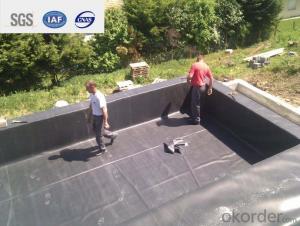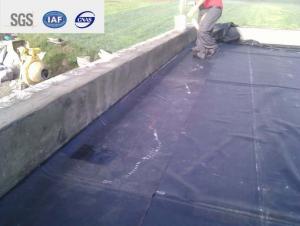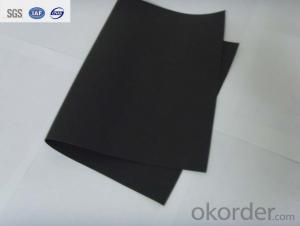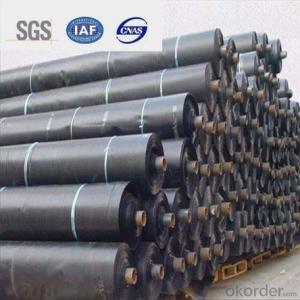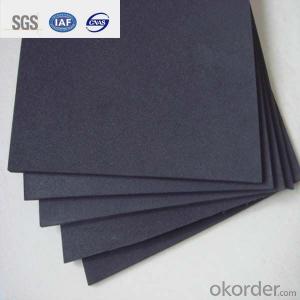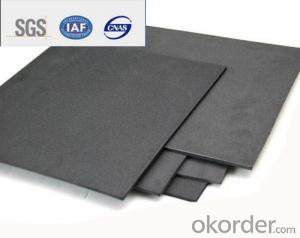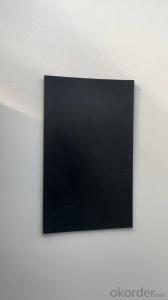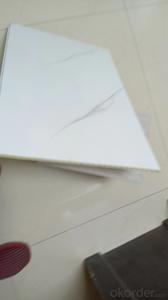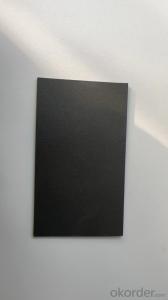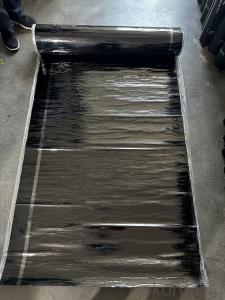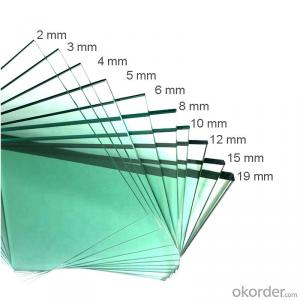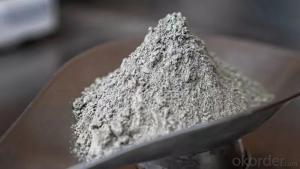EPDM Waterproofing Roofing Membrane for Roof 1.5mm
- Loading Port:
- Qingdao
- Payment Terms:
- TT OR LC
- Min Order Qty:
- 2000 m²
- Supply Capability:
- 800000 m²/month
OKorder Service Pledge
OKorder Financial Service
You Might Also Like
Description Of EPDM Rubber Waterproof Membrane:
1. EPDM waterproof membrane is made from ternary ethylene-propylene rubber, which is for waterproofing of exposed and non-exposed applications.
2. EPDM waterproof membrane production adopts the world-advanced equipment of cold feeding extrusion and continuous vulcanization technology.
3. EPDM waterproof membrane is of high elasticity among high polymer waterproof materials and becomes a world-popular waterproofing material.
Main Features of EPDM Rubber Waterproof Membrane:
1. Excellent physical and mechanical performance
2. High tearing resistance
3. Good deformation adaptability
4. High puncture resistance
5. High aging resistance
6. UV resistance
Specifications of EPDM Rubber Waterproof Membrane:
Material | EPDM Rubber |
Size | 1.2m (width)*20m (length) or customized, weldable type 2.05m or 4m width |
Thick | 1.2mm, 1.5mm, 2.0mm |
Type | Vulcanized & Weldable |
Pattern | Non-reinforced (homogeneous) |
Certificate | ISO9001/14001 |
Applications of EPDM Rubber Waterproof Membrane:
1.Roofs, Basement, Toilets
2. Industrial and civil building waterproofing
3. Geosynthetic liner for swimming pool, channels, irrigation system
4. Especially suitable for projects with high requirements in durability, anti-corrosion and deformation.
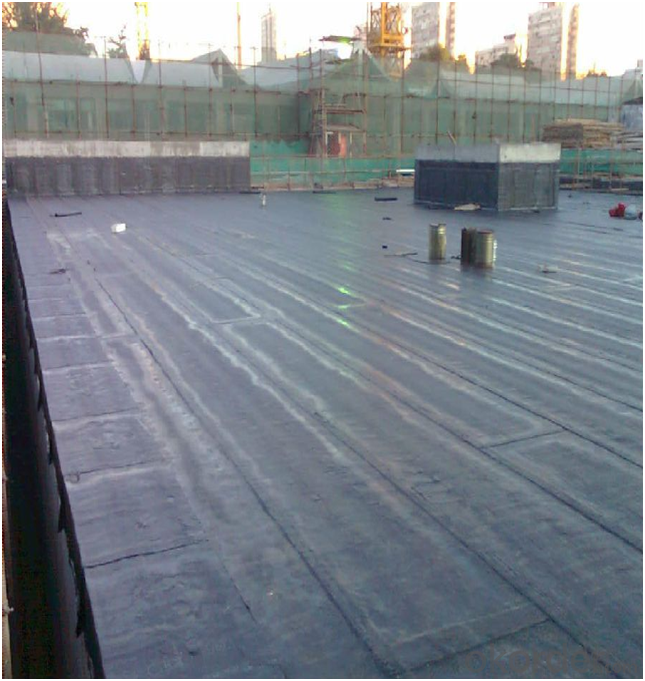
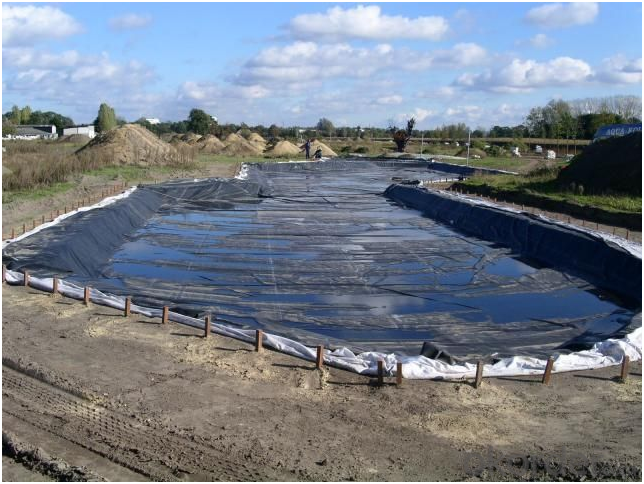
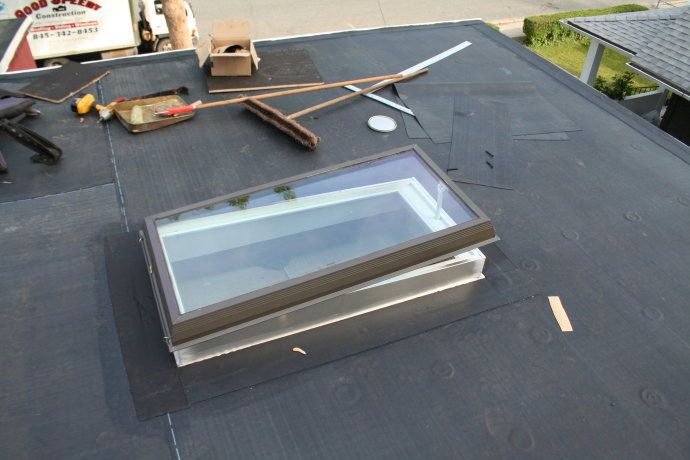
FAQ:
1. What are we supplying?
We are specialized in producing Colorful Asphalt Roof Shingle, SBS/APP modified bitumen waterproof membrane, Self adhesive bitumen waterproof membrane, PVC waterproofing membrane, EPDM rubber roofing membrane, Single Component Polyurethane Waterproof Coating, and Spray Polyurea Waterproof Coating.
2. How Many years experience do we have?
We have been exported to more than 20 countries in the past 15 years.
3. How long do we usually reply your request?
We always reply our customer within 24 hours.
- Q:Can a waterproofing membrane be applied to existing structures or only during construction?
- A waterproofing membrane can be applied to existing structures as well as during construction. It can be retrofitted onto existing surfaces to provide protection against water infiltration and prevent moisture-related issues.
- Q:Can a waterproofing membrane be used on precast zinc surfaces?
- Precast zinc surfaces can indeed benefit from the use of a waterproofing membrane. These membranes are specifically designed to safeguard various surface types against water infiltration, including concrete, metal, and zinc. By creating a protective barrier, these membranes effectively prevent water from permeating the surface. This is especially crucial for precast zinc surfaces that are prone to exposure to moisture or water. The application of a waterproofing membrane to such surfaces can effectively extend their lifespan and shield them against potential water-induced damage, such as corrosion or deterioration. Therefore, it is essential to carefully choose a waterproofing membrane that is compatible with zinc and meticulously adhere to the manufacturer's instructions regarding proper application and maintenance.
- Q:Are waterproofing membranes suitable for below-grade applications?
- Yes, waterproofing membranes are suitable for below-grade applications. These membranes are specifically designed to prevent water infiltration into basements, foundations, and other below-ground structures. They provide a protective barrier against groundwater, ensuring the integrity and longevity of the structure.
- Q:Is a waterproofing membrane resistant to hydrocarbons or oils?
- Yes, a waterproofing membrane is typically resistant to hydrocarbons or oils.
- Q:Can a waterproofing membrane be used in renovation or retrofitting projects?
- Certainly, a waterproofing membrane is a viable option for use in renovation or retrofitting endeavors. In fact, it often plays a crucial role in these projects, guaranteeing the long-term resilience and safeguarding of the building or structure. Waterproofing membranes are specifically designed to establish a barrier against moisture infiltration, effectively thwarting water damage, mold proliferation, and structural decay. When engaging in renovation or retrofitting tasks, it is not uncommon to encounter predicaments such as leaks, cracks, or deteriorated building materials that undermine the building's waterproofing system. In such scenarios, the application of a waterproofing membrane over the affected areas proves to be a reliable method of sealing and protecting them from further harm. This can be accomplished both internally and externally, tailored to the specific requirements at hand. Waterproofing membranes are available in a variety of forms, including sheet membranes, liquid coatings, or spray-applied membranes. They can be employed on various surfaces such as roofs, walls, basements, and even foundations. These membranes possess qualities such as flexibility, durability, and resistance to water and other environmental pressures, rendering them exceptional for renovation or retrofitting undertakings where augmenting the building's waterproofing capabilities is imperative. In conclusion, it is highly advisable to incorporate a waterproofing membrane into renovation or retrofitting ventures to ensure the endurance and integrity of the building. It serves as a proactive measure to preclude future water damage, preserve structural stability, and enhance the overall quality of the revitalized or retrofitted space.
- Q:Can a waterproofing membrane be used for data centers?
- Yes, a waterproofing membrane can be used for data centers. Waterproofing membranes are commonly used in construction to prevent water intrusion and leakage. In data centers, where protection against water damage is crucial for sensitive equipment and infrastructure, a waterproofing membrane can provide an additional layer of protection to safeguard against potential water leaks or flooding.
- Q:Can a waterproofing membrane be used for green roofs?
- Yes, a waterproofing membrane can be used for green roofs. In fact, it is a crucial component of the green roof system. A green roof consists of a layer of vegetation, growing medium, and a waterproofing membrane that prevents water from seeping into the building. The waterproofing membrane acts as a barrier to protect the structure underneath from water damage. It is designed to withstand the constant exposure to moisture and ensure that water does not penetrate through to the building. Additionally, the membrane helps to retain water within the green roof system, allowing for proper drainage and irrigation. Therefore, a high-quality waterproofing membrane is essential for the successful installation and functioning of a green roof.
- Q:PVC waterproof membrane effect how
- 4, hot-melt method: the use of flame heater melting hot-melt waterproofing membrane at the bottom of the hot melt adhesive bonding method of construction.
- Q:Can a waterproofing membrane be used on concrete block walls?
- Concrete block walls are prone to water infiltration, which can cause problems like mold, mildew, and structural harm. To combat this, a waterproofing membrane can be utilized on the walls. This membrane acts as a protective shield, applied to the surface of the concrete blocks, effectively stopping water from seeping in. By creating a moisture-resistant barrier, it establishes a tight seal, preventing water from entering the interior of the walls. This aids in preserving the walls' integrity and safeguards against water-related damage. However, it is crucial to ensure that the waterproofing membrane is correctly installed and that any existing cracks or gaps in the concrete block walls are adequately sealed before its application.
- Q:Are waterproofing membranes resistant to gasoline?
- Yes, waterproofing membranes are generally resistant to gasoline. Most waterproofing membranes are designed to be chemically resistant and can withstand exposure to various chemicals, including gasoline. However, it is important to note that the level of resistance can vary depending on the specific type of membrane and its composition. Some membranes may offer better resistance to gasoline than others. Additionally, prolonged exposure to gasoline can still potentially damage or degrade the membrane over time, so it is always recommended to take necessary precautions and avoid prolonged exposure to harsh chemicals.
1. Manufacturer Overview |
|
|---|---|
| Location | |
| Year Established | |
| Annual Output Value | |
| Main Markets | |
| Company Certifications | |
2. Manufacturer Certificates |
|
|---|---|
| a) Certification Name | |
| Range | |
| Reference | |
| Validity Period | |
3. Manufacturer Capability |
|
|---|---|
| a)Trade Capacity | |
| Nearest Port | |
| Export Percentage | |
| No.of Employees in Trade Department | |
| Language Spoken: | |
| b)Factory Information | |
| Factory Size: | |
| No. of Production Lines | |
| Contract Manufacturing | |
| Product Price Range | |
Send your message to us
EPDM Waterproofing Roofing Membrane for Roof 1.5mm
- Loading Port:
- Qingdao
- Payment Terms:
- TT OR LC
- Min Order Qty:
- 2000 m²
- Supply Capability:
- 800000 m²/month
OKorder Service Pledge
OKorder Financial Service
Similar products
New products
Hot products
Related keywords
